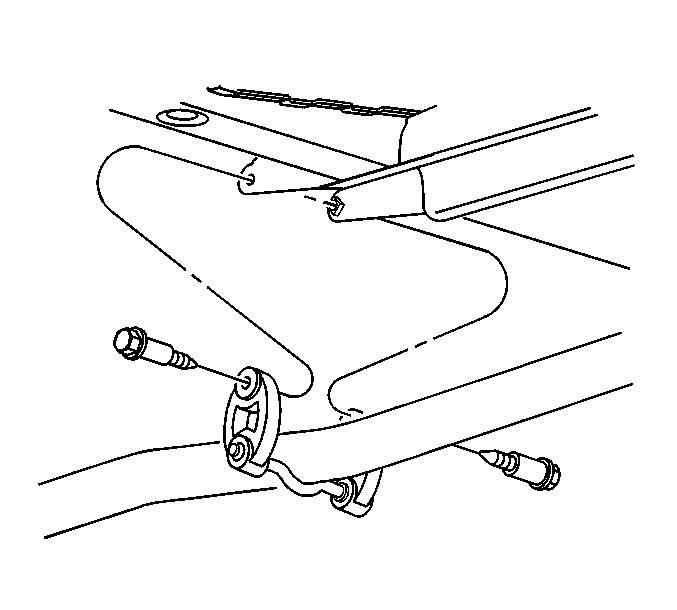Removal Procedure
Servicing of the catalytic converter, resonator or pipe requires the replacement of the exhaust system as a complete one-piece unit.
Caution: In order to avoid being burned, do not service the exhaust system while it is still hot. Service the system when it is cool.
Caution: Always wear protective goggles and gloves when removing exhaust parts as falling rust and sharp edges from worn exhaust components could result in serious personal injury.
- Raise and support the vehicle. Refer to Lifting and Jacking the Vehicle in General Information.
- Remove the oxygen sensor wiring harness heat shield. Refer to Oxygen Sensor Wiring Harness Heat Shield Replacement .
- Disconnect the heated oxygen sensor at the pigtail.
- Remove the heated oxygen sensor if replacement is necessary. Refer to Heated Oxygen Sensor 2 Replacement in Engine Controls - 3.5 L. or Heated Oxygen Sensor Replacement - Bank 1 Sensor 2 in Engine Controls - 4.0 L.
- Remove the four nuts securing the catalytic converter to the exhaust manifold pipe.
- Remove the catalytic converter gasket. Do not reuse the gasket.
- Suitably support the exhaust system.
- Remove the two bolts securing the center exhaust hangers to the rear suspension support brackets.
- Remove the two bolts securing the rear exhaust hanger brackets to the rear compartment rails.
- With the aid of an assistant, Lower the exhaust system.
- Remove the two nuts securing the rear exhaust hangers to the rear exhaust hanger brackets.
- Remove the rear exhaust hanger brackets from the rear exhaust hangers.




Installation Procedure
- Install the rear exhaust hanger brackets to the rear exhaust hangers.
- Install the two nuts securing the rear exhaust hangers to the rear exhaust hanger brackets.
- Place a NEW catalytic converter gasket over the catalytic converter studs.
- With the aid of an assistant, raise the exhaust system into position, aligning the catalytic converter with the exhaust manifold pipe.
- Finger tighten the four nuts to the catalytic converter studs.
- Install the two bolts securing the rear exhaust hanger brackets to the rear compartment rails.
- Install the two bolts securing the center exhaust hangers to the rear suspension support brackets.
- Tighten the four catalytic converter nuts previously installed in step 5.
- Install the heated oxygen sensor. Refer to Heated Oxygen Sensor 2 Replacement in Engine Controls - 3.5 L. or Heated Oxygen Sensor Replacement - Bank 1 Sensor 2 in Engine Controls - 4.0 L.
- Install the oxygen sensor wiring harness heat shield. Refer to Oxygen Sensor Wiring Harness Heat Shield Replacement .
- Lower the vehicle.

Notice: Use the correct fastener in the correct location. Replacement fasteners must be the correct part number for that application. Fasteners requiring replacement or fasteners requiring the use of thread locking compound or sealant are identified in the service procedure. Do not use paints, lubricants, or corrosion inhibitors on fasteners or fastener joint surfaces unless specified. These coatings affect fastener torque and joint clamping force and may damage the fastener. Use the correct tightening sequence and specifications when installing fasteners in order to avoid damage to parts and systems.
Tighten
Tighten the rear exhaust hanger nuts to 30 N·m (22 lb ft).

Notice: When inspecting or replacing exhaust system components, make sure there is adequate clearance from all points on the underbody to prevent overheating of the floor pan and possible damage to the passenger compartment insulation and trim materials.
Notice: Do not over-flex or damage the flex joint when moving the flex joint from the normal mounting position.

Tighten
Tighten the rear exhaust hanger bolts to 50 N·m (37 lb ft).

Tighten
Tighten the center exhaust hanger bolts to 30 N·m (22 lb ft).
Tighten
Tighten the catalytic converter nuts to 25 N·m (18 lb ft).
